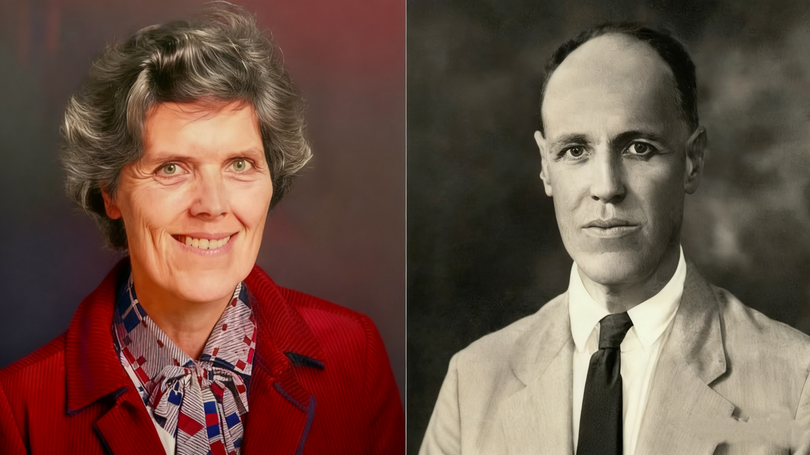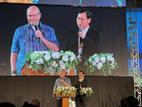On September 21, 2025, Eileen Crossman, daughter of the "Apostle to Lisu People" James Outram Fraser and author of Mountain Rain, passed away at the age of 92.
Her memorial service was held on October 10 at Lansdowne Church in Bournemouth, southern England, where family members and church congregants gathered to honor her life.
James O. Fraser, a pioneer missionary who preached to the Lisu people in southwestern China, had three daughters, and Eileen was his second. Born in China on May 1, 1933, Eileen spent her early childhood among ethnic minority communities in southwest China—the region where her father devoted his life to serving the Lisu people.
In 1938, Fraser died of cerebral malaria in China. Eileen was only five years old at the time and witnessed his passing, so her time with him was very short. Her image of her father was formed largely through his letters, her mother Roxie's stories, and the spiritual legacy he left behind.
After returning to England, Eileen received her education there. Though far from the mission field, her home environment and her mother's faith kept her deeply connected to her father's calling. Her distance from him in life seemed to spark a desire to understand him more deeply through his writings. She studied his diaries, letters, and reports intently—materials that later became the foundation for her book Mountain Rain.
At the memorial service, David Pickard, who served as the general director of the Overseas Missionary Fellowship (OMF, formerly the China Inland Mission) from 1991 to 2001 and is a member of Lansdowne Church, spoke of Eileen's humility.
"She was actually one of the most understated people I have ever met in all my life," he said. He noted that although her parents were well-known missionaries, she rarely spoke about her heritage, and that their conversations often focused on mission work.
"I can tell you, around the OMF world, we are remembering the life of Eileen herself."
Eileen's younger sister, Margaret, also shared family memories. There were three sisters in all: Catherine, the eldest, who passed away some years ago; Eileen, the middle sister; and Margaret, the youngest.
Margaret described Eileen with the word fortitude. She recalled how Eileen often spoke fondly of their childhood in Yunnan, "Eileen used to talk of the very happy days she had there in Yunnan, southwest China, the foothills of the Himalayas, of playing on those sunny mountains where she lived so long ago—stayed in her memories as a very special time."
"She remembers running alongside her parents for miles as they rode their horses and of riding on mules," Margaret said. She added that Eileen talked about how she and her older sister, Catherine, were carried along mountain tracks in baskets borne on bamboo poles. "These two girls would be bouncing in their baskets, and she loved it."
When their father fell seriously ill with cerebral malaria and was later unable even to speak, five-year-old Eileen sat faithfully by his bedside. "She sat very long and lovingly beside his bed as he stroked her head until the day he died," Margaret said. "She remembered that very clearly."
After Fraser's death, Roxie, widowed and pregnant, was left with five-year-old Eileen and her unborn baby. OMF sent an experienced nurse-midwife, Dorothy Burrows, to accompany them and escort them to a hospital just across the Burmese border so the baby could be registered as British rather than Burmese.
Margaret, who was that unborn baby, shared her dramatic birth story. "When they got there, the doctor had gone," she said. "Dorothy had delivered hundreds of babies in her life, but she said she had never faced such a difficult case. She rolled up her sleeves and said that if ever she prayed, she prayed her hardest at that time."
"After a little while, it became apparent that Roxy was going to pull through. It was very doubtful all the time. And a little while later, a Burmese nurse went to see the baby, who was presumed dead. And she said, 'Excuse me. I think the baby's alive.' That was my beginning. All this time, little Eileen, aged five, was sitting alone, anxious and bewildered. I remember her describing it to me."
During World War II, the family was interned for three years in a civilian detention camp in Weihsien (now Weifang), until the end of the war on August 17, 1945.
"The camp was civilian rather than military and, as such, was less physically brutal, but there was certainly considerable deprivation," Margaret recalled.
Food was scarce: breakfast was a piece of bread mashed in hot water—the same for supper. Lunch was a thin stew or soup; you couldn't tell which. Everyone brought their own container—how much you got depended on how big it was. Eileen had a plate, which was quite good for a six- or seven-year-old, but her friend only had a soap dish, so that's all she could eat from. The only exception was Christmas Day, when we got a little lard on our bread. People grew very hungry and very thin, and often unwell.
After being liberated, the family spent six months traveling back to England.
Years later, Eileen and Margaret returned to Yunnan to visit their father's grave. "It was a lonely single grave in a field covered with bushes and thorns," Margaret said. They also visited a memorial built in Fraser's honor—"a tall pillar and lovely gardens around it."
"We realize later there's also another lovely memorial to James in a similar style in Thailand, and I think possibly in Burma as well. All of them thanking God for James and all he had done for their people, bringing them to the knowledge of Christ."
Originally published by the Christian Times
- Edited and translated by Elena Li












